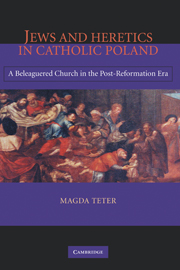Book contents
- Frontmatter
- Contents
- List of Illustrations
- Preface and Acknowledgments
- Note on Terms, Spelling, and Translations
- Abbreviations
- JEWS AND HERETICS IN CATHOLIC POLAND
- Introduction
- 1 “One Mystical Body … Only One Shepherd”: The Church Ideals of Social Order
- 2 The Upset Social Order: Nobles and the Jews in Poland
- 3 Heresy and the Fleeting “Triumph of the Counter-Reformation”
- 4 “Bad and Cruel Catholics”: Christian Sins and Social Intimacies Between Jews and Christians
- 5 “A Shameful Offence”: The Nobles and Their Jews
- 6 “Countless Books Against Common Faith”: Catholic Insularity and Anti-Jewish Polemic
- 7 “Warding Off Heretical Depravity”: “Whom Does the Catholic Church Reject, Condemn and Curse?”
- Conclusion: Did the Counter-Reformation Triumph in Poland?
- Glossary
- Notes
- Selected Bibliography
- Index
5 - “A Shameful Offence”: The Nobles and Their Jews
Published online by Cambridge University Press: 12 January 2010
- Frontmatter
- Contents
- List of Illustrations
- Preface and Acknowledgments
- Note on Terms, Spelling, and Translations
- Abbreviations
- JEWS AND HERETICS IN CATHOLIC POLAND
- Introduction
- 1 “One Mystical Body … Only One Shepherd”: The Church Ideals of Social Order
- 2 The Upset Social Order: Nobles and the Jews in Poland
- 3 Heresy and the Fleeting “Triumph of the Counter-Reformation”
- 4 “Bad and Cruel Catholics”: Christian Sins and Social Intimacies Between Jews and Christians
- 5 “A Shameful Offence”: The Nobles and Their Jews
- 6 “Countless Books Against Common Faith”: Catholic Insularity and Anti-Jewish Polemic
- 7 “Warding Off Heretical Depravity”: “Whom Does the Catholic Church Reject, Condemn and Curse?”
- Conclusion: Did the Counter-Reformation Triumph in Poland?
- Glossary
- Notes
- Selected Bibliography
- Index
Summary
At the end of the seventeenth century, a noted franciscan preacher, Antoni Węgrzynowicz, in a sermon addressed to an audience of nobles, lamented the nobles' blatant disobedience to Church teachings, their questionable daily behavior, their assaults on the Church during political gatherings, and their relationships with Jews. To appeal to the nobles' own fears, Węgrzynowicz claimed the political crises Poland faced, including the destructive wars with its neighbors, were a consequence of the nobles' reckless conduct. He urged that they return to the right path, one more in line with Church teachings:
You will not hear during the sessions of the Sejm and the Sejmiks [regional diets] anything but screaming against priests, and servants of God … The sins of the Poles led to the collapse of the integrity of the [territories] of the Polish Crown, so our motherland has shrunk as it lost so many provinces … O Poles! Bring your sins to an end … Stop violating the laws, privileges and freedoms of the Church, give to God what belongs to God, to the Church what belongs to the Church and to the King what belongs to [him]. End all injustice in courts, and judge the cases of the poor the same way you would those of the rich, don't be corrupted. Stop giving special and undeserved favors to the Jews, [these favors] are a sign of great contempt for the Christian religion. Stop the drunkenness, adulteries and all kinds of lewdness. Refrain, Ladies and Lords, from luxurious sophisticated clothes!
- Type
- Chapter
- Information
- Jews and Heretics in Catholic PolandA Beleaguered Church in the Post-Reformation Era, pp. 80 - 98Publisher: Cambridge University PressPrint publication year: 2005



